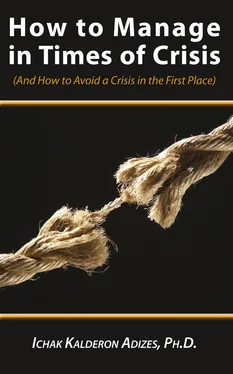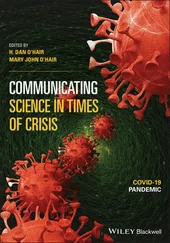Dr. Ichak Adizes
How tot manage in Time of Crisis
(And How to Avoid a Crisis in the First Place)
ADDITIONAL WORKS BY THE AUTHOR
Managing Corporate Lifecycles: An Updated and Expanded Look at the classic work Corporate Lifecycles (2004)
The Ideal Executive: Why You Cannot Be One and What To Do About It: A New Paradigm for Management (2004)
Management/Mismanagement Styles: How to Identify a Style and What to Do About It (2004)
Leading the Leaders: How to Enrich Your Style of Management and Handle People Whose Style is Different from Yours (2004)
The Pursuit of Prime (1996)
Mastering Change: The Power of Mutual Trust and Respect in Personal Life, Family, Business and Society (1993)
How to Solve the Mismanagement Crisis (1979)
Self-Management: New Dimensions to Democracy (with Elisabeth Mann-Borgese) (1975)
Industrial Democracy, Yugoslav Style: The Effect of Decentralization on Organizational Behavior (1971)
To view a full list of all available Adizes Institute publications, or to place an order, please visit www.adizes.com/store

© 2009 Dr. Ichak Adizes
Published by
Adizes Institute Publications
1212 Mark Avenue
Carpinteria
Santa Barbara County, California, USA 93013
805-565-2901; Fax 805-565-0741
Website: www.adizes.com
All rights reserved. No part of this publication may be reproduced in any form, by any means (including electronic, photocopying, recording or otherwise), without permission of the author and the publisher.
Library of Congress Control Number: 2009902144
Design and layout by RJ Communications LLC, New York
Printed in the United States of America
Additional copies may be ordered from www.adizes.com.
I want to thank my associates Nebojsa Caric (Adizes South East Europe), Sunil Dovedy (Adizes USA), and Carlos Valdesuso (Adizes Brazil) for their most helpful comments on an early draft. My thanks go to Nan Goldberg for editing my speech and Emily Garvin for copy editing the final draft.
The following is an edited version of a presentation made at IBS—the Academy of Economics of the Russian Federation—on November 14, 2008. Dr. Adizes is the honorary scientific advisor to IBS, from which he received an honorary doctorate in 2007.
A crisis can be a real blessing to any person, to any nation, for all crises bring progress.
Creativity is born from anguish, just as the day is born from the dark night.
It is in crisis that inventiveness, discoveries, and grand strategies are born.
He who overcomes crisis overcomes himself, without himself being overcome.
He who blames his failure on a crisis neglects his own talent, and is more respectful of problems than of solutions.
The true crisis is the crisis of incompetence.
The greatest fault of both people and nations is the laziness with which they attempt to find the solutions to their problems.
There is no challenge without crisis.
And without challenges, life becomes a routine, a slow death.
Without crisis, there is no merit. It’s in a crisis that we can show the very best in us, because without crises every wind becomes a mere caress.
To speak about a crisis is to promote it, and yet to be silent about a crisis is to promote conformity.
Let us work hard instead. Let us stop, once and for all, the crisis of our tragic unwillingness to overcome challenges.
Albert Einstein
RIGHT NOW, IN 2009, the world is in a deep financial crisis. It affects everyone, particularly companies that are undergoing a transformation into an increasingly competitive economy and experiencing rapid and continual economic, political, and technological changes: companies that must have access to credit in order to continue developing.
In general, people don’t like crises. Although the dictionary meaning of “crisis” is an upheaval or turning point that causes a decisive change—for worse or for better—the word usually has a negative connotation. When people hear the word “crisis,” they automatically assume it’s a disaster. Most people dread crises, and that goes even more for managers of organizations, who must worry about protecting their organizations’ existence.
But it doesn’t have to be that way. And here is why.
Let us start with an analogy. You probably remember that back when you were a child, your parents told you, “Do not take a hot shower and then go outside in the cold weather! You will catch a cold!” Well, I always wondered why I would catch a cold if I went outside with wet hair in freezing temperatures, while in Finland and Russia people like to go to the sauna, sweat, then go outside and roll in the snow. It makes them feel invigorated! Some people in Siberia, including the aged, dig a hole in the ice on a lake or river, then dive into the freezing water—and they also feel invigorated! If I did that I would probably get pneumonia and die.
Why the difference?
What we have to realize is that it’s not the cold that makes us sick. It is the rapid change from hot to cold. But that still doesn’t explain why people in Finland become invigorated by the quick change from hot to cold, while the same change makes me sick.
It’s all about the strength, or lack of strength, of your organism. If your organism is robust, change makes you stronger. But if you’re weak, change can kill you.
This phenomenon does not apply only to people but to organizations, too. Organizations that are prepared to deal with change are invigorated by it. Those that are not fall ill and risk bankruptcy.
What does it mean to have a “strong organism”? Does it mean to have big muscles? No. It means that the organism is strong enough to deal with change. It is strength not of physique but of the capacity to handle change.
In order to understand what it means to have a strong organization that is capable of handling change, we should first discuss how change causes organizational “diseases.” By understanding the causes of problems created by change, we will be able to identify the appropriate remedy.
Change is nothing new. Change has been here forever, for billions of years. What is new is that the rate of change is accelerating, faster and faster and faster… Our grandparents probably made one strategic decision in their lifetimes (to move to a new city, change jobs, etc.), and our parents made strategic decisions every fifteen or twenty years. We might make strategic decisions every ten years, and most probably, our children are going to make strategic decisions every couple of years, maybe even every year.
The nature of change and its repercussions
THE INCREASING RATEof change has repercussions. When change occurs, problems arise: what to do in the new situation or with the new events facing us. As change accelerates, problems are attacking us faster. Everybody has more problems than they can handle. People are falling behind faster and getting more and more stressed.
But when we solve the problem, what happens? The solution itself is a cause of change, which now creates new problems. So, the more problems we solve—guess what? —the more problems we have. The end result is that we will always have problems.
Читать дальше













